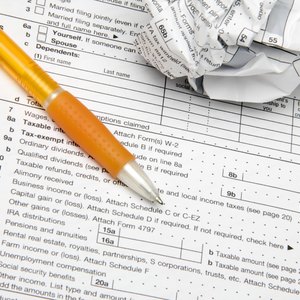
Job compensation often includes more than just a salary; it is increasingly common for businesses to offer their employees stock options. If an employee decides to exercise his stock options and then sell them, his broker will give him a 1099-B form detailing his sale transactions for the year. An employee can use this form to calculate his income tax liability.
1099-B
Every broker or barter exchange is required to file a 1099-B for each person to whom that broker has sold stocks, bonds, commodities, futures, forwards, or any debt instrument. Covered securities (those for which the investor owned stock), including those with short-term and long-term gains and non-covered securities, must each be reported on separate 1099-B forms, both to the IRS and to the investor. Investors can expect to receive their 1099 well before tax day.
Stock Exercise
Because stock options are offered at rates below market value, taxable income is considered the difference between the exercise price and the market price. Your employer is responsible for reporting this compensation element to the IRS; however, if the employer does not, you must still report the income on your 1040 form. In most cases the stock option is non-qualified, which means that income from stock options is reported when the option is exercised and may be taxed based on short-term or long-term capital gains.
1099 Uses
The IRS uses a 1099-B form to verify and track any investment income that you may have earned during a given tax year. Because both the investor and IRS receive a 1099, the government knows exactly how much you owe in capital gains. While full-service brokers often calculate tax liability for their clients, those who have accounts with other types of firms rely on their 1099-B form to determine their tax liability and keep track of their investments from one year to the next.
Short-term vs. Long-Term
If you exercise and sell your stock within a year or less, your gains are considered short-term. Likewise, if you exercise and sell you stock more than a year later, the IRS considers this income to be long-term capital gains. The transactions in your 1099-B indicate your tax liability to be equal to the difference between your exercise price and the sale price, multiplied by the number of shares. An accountant may be required to help you determine the tax liability on your stock options.
References
- Internal Revenue Service: Instructions for Form 1099-B
- Turbotax: Non-Qualified Stock Options
- Internal Revenue Service. "Topic No. 427 Stock Options." Accessed Jan. 29, 2020.
- Internal Revenue Service. "Publication 525: Taxable and Non-Taxable Income," Page 12. Accessed Jan. 15, 2020.
- Internal Revenue Service. "Form 3921 (Rev. Oct. 2017)," Pages 1-7. Accessed Jan. 15, 2020.
- Internal Revenue Service. "Form 3921 (Rev. Oct. 2017)," Page 3. Accessed Jan. 15, 2020.
- Internal Revenue Service. "Publication 525: Taxable and Nontaxable Income," Page 11. Accessed Jan. 15, 2020.
Writer Bio
Sophia Harrison began writing professionally in 2007. She has a Master of Arts in economics from the University at Buffalo-SUNY, as well as experience working in the New York City financial industry.

